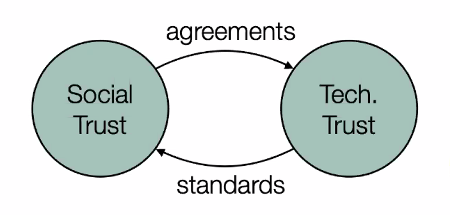Earth Science Information Partners (ESIP) researchers gathered both virtually and in-person in Pittsburg, PA for the Summer 2022 meeting. The 2022 meeting theme was “Data for All People: From Generation to Use & Understanding.”

Joan Damerow and Dylan O’Ryan from ESS-DIVE attended the meeting virtually, and recap a few takeaway points and resources from the meeting that may be useful for DOE ESS.
- The Building a Thriving Open Science session focused on addressing open science goals, barriers encountered in moving towards Open Science, and trends around the advancement of Open Science practices. A few key themes emerged from the discussion, including the importance of trust and transparency, and open standards. Mark Parsons shared a graphic that conveyed the importance of both social and technological trust through agreements and standards.

- The Human atlas of Earth science information: a use case for Federated Knowledge Graphs session outlined the potential of federated knowledge graphs to identify and connect related data and information online. The session provided some introductory resources to learn about knowledge graphs (e.g. Intro to Knowledge Graphs Video), and discussed some recent relevant projects in usage based discovery (e.g. NASA EOSDIS Dataset to publication linkages). See graph from Vincent Inverso from NASA depicting connections for research articles.

- The Towards A Guide for FAIR Digital Earth Science Data and Quality Information – Approaches and Practices Promoting Trustworthy FAIR Data and Repositories Session discussed dataset quality and promoting FAIR practices for datasets and repositories. Lightning talks represented relevant projects working towards promoting FAIR data and repository practices – such as NASA’s ECODIS (Earth Observing System Data and Information System) and the USGS State of the Data Project. One referenced journal publication provides guidelines for datasets: FAIR-DQI Guidelines (Findable, Accessible, Interoperable, Reusable) (Dataset Quality Information).
- The How to Use Schema.org on your Dataset Web Pages session provided a great tutorial on using Schema.org, which you can explore here: https://bit.ly/soso-tutorial. ESS-DIVE plans to participate in the Schema.org ESIP cluster towards expanding Science on Schema.org to better connect related data across online data systems for interdisciplinary research.
- During the Defining 5 star data for researchers session, members of the Sustainable Data Management Cluster proposed a star-rating system for data and data repositories, and facilitated feedback on the merits of this approach and potential alternatives. Most agreed that a rating system may not be the best approach, but that simple guidelines may assist researchers in choosing better data repositories for their data publications. The cluster will use feedback from the session to revise simplified guidelines for researchers.
- In the Cite your samples! Drafting guidelines for sample and specimen citation in the earth sciences session, the Physical Samples Curation Cluster reviewed drafted guidelines for sharing sample data in journal publications. Participants also provided updates relevant for sample data curation, such as the AGU session on making samples, specimens and sampled features FAIR.